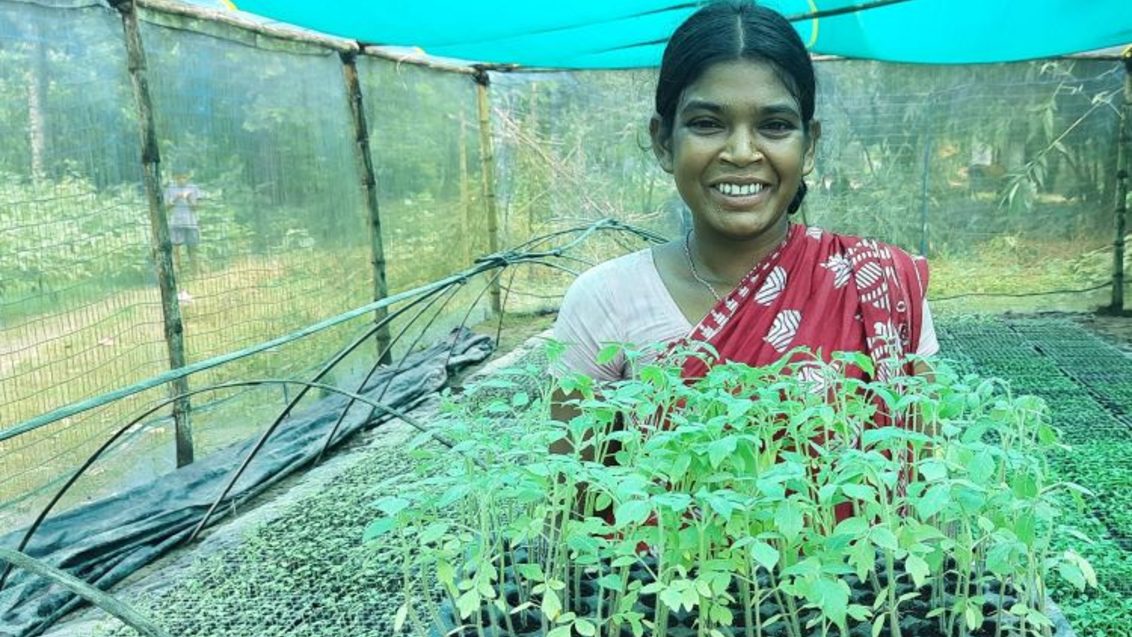An uncertain “Yes” that led to success

Double disadvantages shouldn’t stop anyone from succeeding in business. Our entrepreneur program in Bangladesh opens new routes to better lives. As well as raising incomes, inclusion also increases respect.
Dishing up some fish and rice before her daughter heads to school, Joshna Hembrom has a brief flashback: How impossible this food and their new clothes would have been only two years ago! As day laborers, the parents faced a constant struggle to meet their two children’s needs.
Joshna Hembrom is one of more than 200,000 indigenous Santals in northern Bangladesh. Now 27, she lives in Dinajpur District. Conventionally speaking, the odds were doubly stacked against her: as a young woman in a male-dominated society and as a Santal.
Like most of this minority ethnic group, Hembrom was landless, unskilled, and could essentially only earn money as a farm helper. Together, she and her husband scraped by on $100 a month. Worse still, the work was seasonal: For half the year there was little or no pay. Hembrom dreamed of decent food, clothes, and education for her children. “Something inside me wanted to change”, she says, “but I didn’t know what to do”.
In June 2019, Hembrom attends a meeting for her community organized by GBK and supported by the Syngenta Foundation. It's an information session on the ChESTA program. Hembrom hears that our Bangladesh team is looking for Santal entrepreneurs to establish Farmers’ Hubs (FH). The visitors show the success of these ‘one-stop commercial agri-service centers’ in different locations across the country. They explain how each Hub can change the lives of local farmers – and of the entrepreneur who runs it.
A program that motivates one to try
Joshna Hembrom starts imagining herself as an FH owner building an affluent future. But she has her doubts: How could she possibly achieve that? The program name ‘ChESTA’ is well chosen. It’s more than just an abbreviation for ‘Changing Economics of Santals Through Agriculture’. In Bangla, chesta means ‘to try’ or ‘an attempt’. Hembrom has nothing to lose. In a shaky voice, she says: “I’m a woman with no money, knowledge, or social connections. But I want to run a Farmers’ Hub.”
That bold statement is a turning point. Our Foundation immediately supports Hembrom’s decision. So do our implementing partners at GBK (Gram Bikash Kendra). “The message from both our organizations is that women and minorities can't be left behind”, explains Nourin Akhter, one of our Foundation's Diversity & Inclusion Champions. “They need tools, tasks, and motivation to grow. We’re committed to providing those.”
The Syngenta Foundation enables new FH entrepreneurs to enjoy training on business development, management, and operations. “We also organize a kick-start with the inventory”, Nourin adds. Like other FH owners, Joshna got the equivalent of $500 in materials for a plant nursery, branding, and other items. On the capacity-building side, she also learned to use our digital eFarmersHub tool for business efficiency.
Joshna Hembrom seized the opportunity with great energy. “Her mental strength, hard work, and husband’s help got her off to a flying start”, says Nourin. “Very sadly, her husband passed away in 2021. But Joshna has shown her great resilience and continues to succeed.”
Building up respect
‘Start small and build up is the unofficial FH motto. Hembrom began by producing and selling vegetable seedlings. She then gradually branched out into other services. These include machinery rental, post-harvest handling, crop aggregation, and selling. GBK has also trained her to provide basic agronomic advice to neighboring farmers. GBK Project Coordinator Najmus Sadeq remains impressed to this day: “Joshna works with passion and integrity. With that professionalism, I think she will achieve her dream.”
Within a few months, Hembrom had built a solid base of 300 customers. She used a small portion of the profit for family expenses and reinvested the rest. She also took out a business loan from a micro-finance institution and repaid it rapidly. “So far I’ve invested about $3000 in my Hub”, she calculates, “and am making a profit of about $400 every month”. Besides her Farmers’ Hub, Hembrom also leads a group of local women who lease land and grow high-value vegetables under protective netting. This brings in extra income.
How things have changed! The landlord for whom Hembrom used to work is now one of her customers. Instead of depending on day labor, she now employs several women in her nursery. “But perhaps the most significant change is in her social standing”, comments Nourin Akhter. “Both her fellow Santals and the local Bangali community salute Joshna for turning her family’s life around and helping the district’s farmers.” Before ChESTA, non-Santals simply viewed the minority as poor laborers. “Now they see Santals as entrepreneurs who can even help Bangali families. That transformation is highly visible and society has fortunately taken it well.” Respect, not envy, is the result.
The ChESTA program currently has 25 Farmers’ Hubs run by Santals. Together they serve 4000 smallholders, including 1500 from Santal households.
Photo: Syngenta Foundation Bangladesh.
